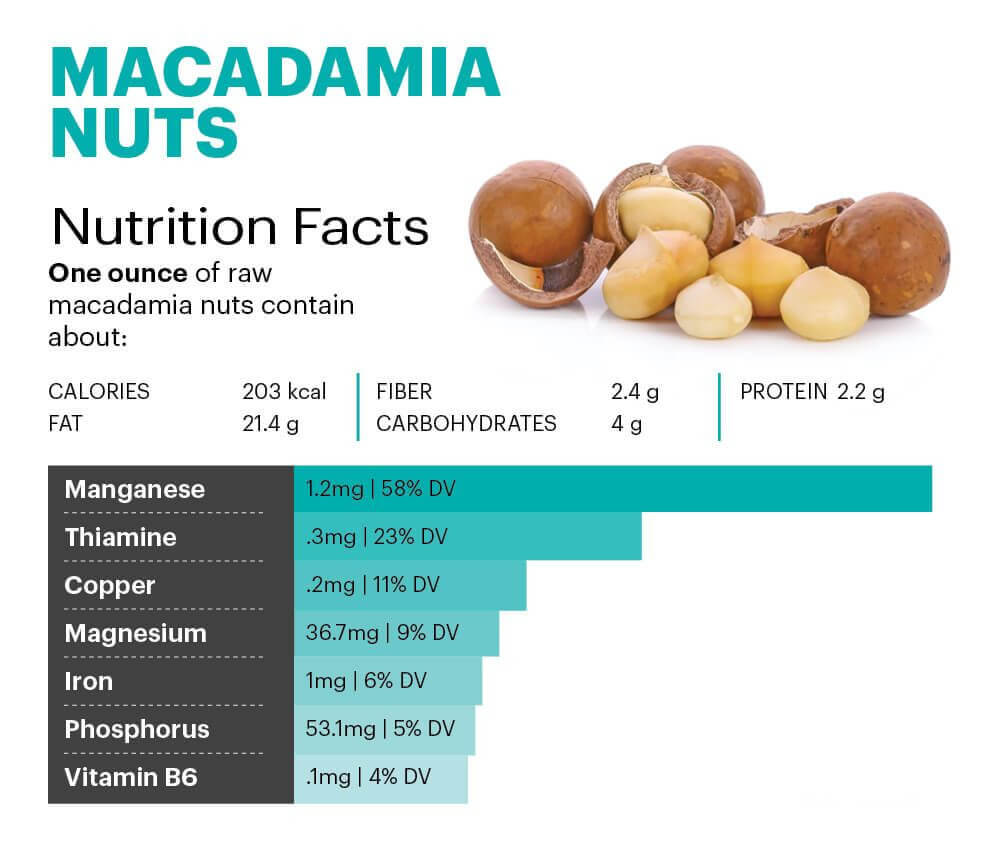Why macadamia?
Macadamia Nut is the King of Nuts!
Is the HARDEST, The most VALUABLE, The HEALTHIEST nut in The World

Our Food is Our Medicine:
Macadamia nuts are rich in vitamins, minerals, fiber, antioxidants and healthy fats.
In a 100-gram amount, macadamia nuts provide 740 calories and are a rich source (20% or more of the Daily Value , DV) of numerous essential nutrients, including thiamine (104% DV), vitamin B6 (21%DV), manganese (195% DV), iron (28% DV), magnesium (37% DV) and phosphorus (27% DV). Macadamia nuts are 76% fat, 14% carbohydrates, including 9% dietary fiber and 8% protein. Compared with other common edible nuts, such as almonds and cashews, macadamias are high in total fat and relatively low in protein. They have a high amount of monounsaturated fats (59% of total content) and contain, as 17% of total fat, the monounsaturated fat, omega-7 palmitoleic acid.


Why choose macadamia nut among other nuts?
Macadamia nuts offer several unique qualities that distinguish them from other types of nuts, making them a popular choice among many individuals. Here are some reasons why macadamia nuts are often preferred:
- Macadamia nuts have a rich, buttery flavor and a smooth, creamy texture that sets them apart from other nuts. Many people enjoy their mild and indulgent taste, making them a sought-after option for snacking or incorporating into various recipes.
- Macadamia nuts are packed with nutrients that contribute to overall health and well-being. They contain a good balance of healthy fats. Macadamia nuts also provide essential vitamins, minerals, and antioxidants, further enhancing their nutritional value.
- Compared to other nuts, macadamia nuts have a lower omega-6 to omega-3 ratio, making them a favorable choice for individuals aiming to achieve a healthier balance of these fatty acids.
- Phytic acid is a compound found in nuts and seeds that can inhibit the absorption of certain minerals, such as iron and zinc. Macadamia nuts have a relatively lower phytic acid content compared to other nuts, which means they may have a lesser impact on mineral absorption.
- Macadamia nuts can be used in various culinary applications, including baking, cooking, and as a topping or ingredient in salads, granolas, and desserts. Their creamy texture and delicate flavor make them a versatile choice for both sweet and savory dishes.
- Macadamia nuts are not among the common allergenic nuts like peanuts, tree nuts (almonds, walnuts, cashews) or soy nuts. This makes macadamia nuts a suitable alternative for individuals with nut allergies, allowing them to enjoy the benefits and flavors of nuts without triggering an allergic reaction.


Potential Benefits:
Strengthens immunity as well as increases resistance to viruses
Macadamia nuts are packed with essential nutrients, including vitamins (such as vitamin B1, B2, and E), minerals (magnesium, potassium, and phosphorus) and antioxidants. These nutrients play vital roles in various bodily functions, including energy production, cell protection, and immune support.
Promotes disease prevention
Macadamia nuts are loaded with flavonoids and tocotrienols, antioxidants that safeguard your body against cellular damage and disease.
Helps maintain a good body shape and lose weight
Macadamia nuts may reduce hunger and promote feelings of fullness, which can benefit weight loss. The soluble fiber in macadamia nuts aids your digestion by feeding your beneficial gut bacteria. In turn, this can improve your gut health.
Protection against diabetes, metabolic syndrome
Despite being relatively low in carbohydrates, macadamia nuts have a low glycemic index, meaning they cause a slow and steady rise in blood sugar levels. This can be beneficial for individuals with diabetes or those aiming to maintain stable blood sugar levels.
Supports the cardiovascular system and protects against heart disease
Macadamia nuts are rich in monounsaturated fats, specifically oleic acid, which is known to promote heart health. Consuming foods high in monounsaturated fats can help reduce bad cholesterol levels (LDL cholesterol) and increase good cholesterol levels (HDL cholesterol), thus reducing the risk of heart disease.
Helps fight inflammation
Regularly eating tree nuts, including macadamia nuts, may reduce your risk of metabolic syndrome and contribute to lower, more stable blood sugar levels. Macadamia nuts are rich in heart-healthy monounsaturated fats.


Supports bone, dental and hair health
Possesses an anti-aging effect that is used for skin care
Flavonoids, antioxidants and a proper balance of essential fatty acids are just a few of the many anti- aging benefits of macadamia nut oil. A fantastic food supplement that will improve the condition of your hair and skin. The creamy taste and texture of macadamia is a key ingredient or garnish in many sweet and savory dishes. Also, it is popular in many vegan dishes as an alternative to milk and butter.
Macadamia Nuts might prevent cancer
Macadamia nuts comes from their flavonoids (the same compounds that give red wine its healthful claim to fame). Flavonoids are compounds naturally found in plants. They help repair damaged plant cells and protect the plant from environmental toxins. When we eat these plants, our bodies turn the flavonoids into antioxidants. Antioxidants search and destroy free radicals (destructive particles in the body that cause heart disease and other conditions). As a result, the flavonoids help lower blood pressure and protect against some forms of cancer.
Helps maintain a good brain health
Macadamia nuts contain several nutrients that support brain health. Vitamin E, for example, acts as an antioxidant and helps protect brain cells from oxidative stress. Additionally, the monounsaturated fats in macadamia nuts have been associated with improved cognitive function and a reduced risk of neurodegenerative diseases.
